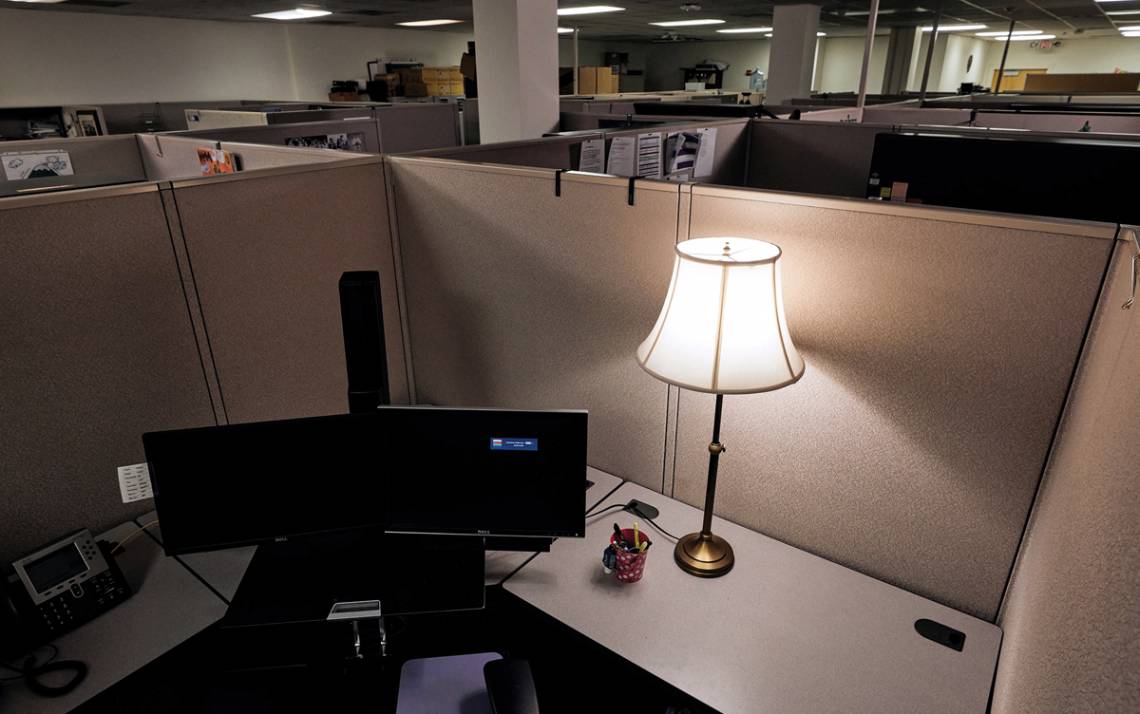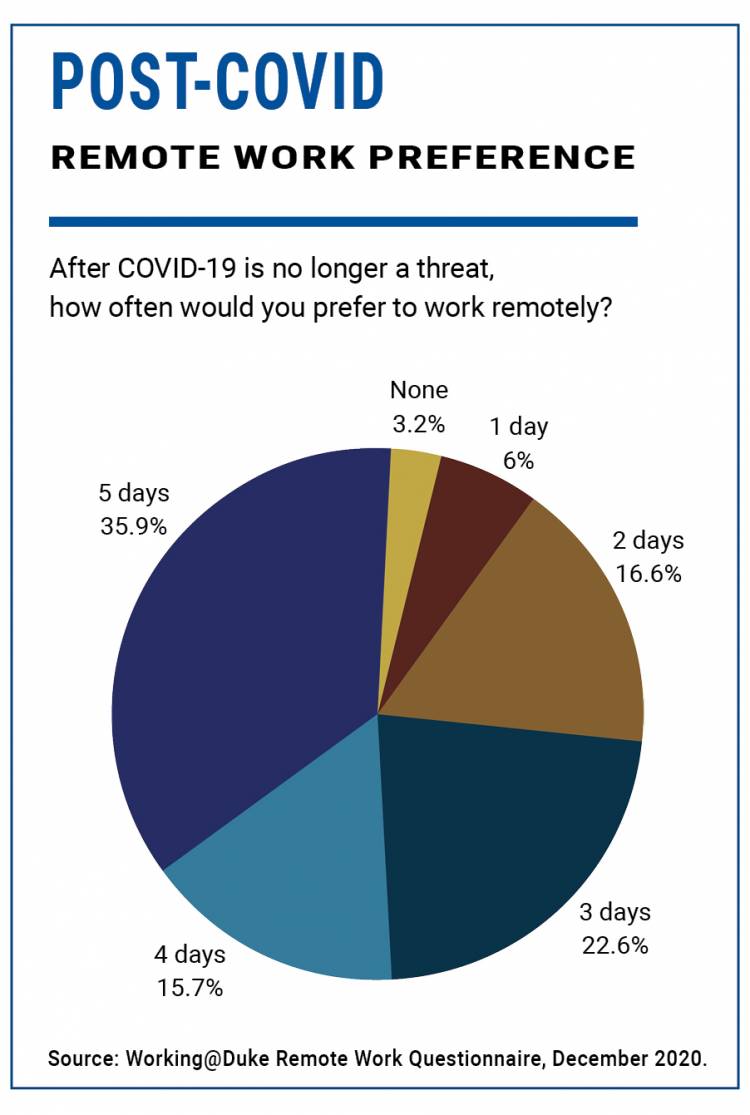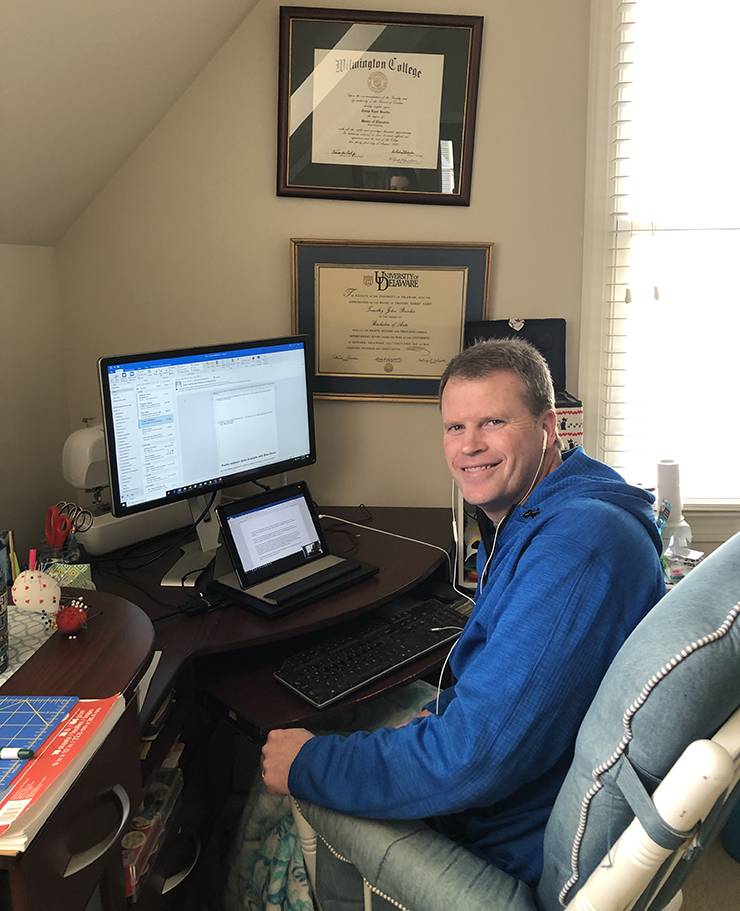A Remote Work Future at Duke
A majority of surveyed employees say they would prefer to work remotely three to five days per week when COVID-19 is no longer a threat

 On most mornings, Heather Rabalais laces up her Brooks sneakers and ventures onto the streets of her Hillsborough neighborhood. It's a habit that began after the pandemic forced her to work from home, and she replaced her daily commute to campus with walks.
On most mornings, Heather Rabalais laces up her Brooks sneakers and ventures onto the streets of her Hillsborough neighborhood. It's a habit that began after the pandemic forced her to work from home, and she replaced her daily commute to campus with walks.
A year later, she's lost 22 pounds, completed a virtual 5K and views her peaceful morning routine as an essential part of her day. And like most colleagues, she credits the shift to remote work with setting the conditions for a healthier lifestyle and more productive workday.
“Working from home has given me that flexibility,” said Rabalais, 49, a Pratt School of Engineering program coordinator.
Rabalais knows that, at some point, the coronavirus crisis will begin to be controlled as all staff and faculty have the opportunity to become fully vaccinated, and she – like thousands of other Duke employees – may return to campus in some capacity. What that looks like is a focus of Duke leaders, who are shaping the institution's post-pandemic work landscape.
A Work-From-Home Committee of 25 university and medical center leaders has been exploring telecommuting strategies for Duke staff. The committee highlighted that Duke's overall remote work approach will evolve and require flexibility at the school, department and unit level due to Duke's variety of roles. And any approach must also weigh maintaining camaraderie and connection to the wider institution. In some units, a 90-day work-from-home pilot is underway to assess positions that could primarily remain remote beyond the pandemic.
 To assess remote work preferences, Working@Duke conducted an online poll of Duke staff and faculty late last year to gauge how often employees would prefer to work remotely after COVID-19 is no longer a threat. Of the slightly more than 2,200 employees who responded, 74 percent would prefer to work remotely three to five days per week, while 3 percent favored no remote work. Employees ranked lack of a commute, enhanced productivity, and flexibility during the day, in that order, as top benefits of remote work. A clear boundary between work and life was the top challenge.
To assess remote work preferences, Working@Duke conducted an online poll of Duke staff and faculty late last year to gauge how often employees would prefer to work remotely after COVID-19 is no longer a threat. Of the slightly more than 2,200 employees who responded, 74 percent would prefer to work remotely three to five days per week, while 3 percent favored no remote work. Employees ranked lack of a commute, enhanced productivity, and flexibility during the day, in that order, as top benefits of remote work. A clear boundary between work and life was the top challenge.
These sentiments align with national data, including a January 2021 “U.S. Remote Work Survey” from PricewaterhouseCoopers (PwC), an international accounting and consulting firm, in which 55 percent of employees said they would prefer to work remotely at least three days per week after the pandemic.
For institutions of higher learning, known for collaboration and shared culture, the widespread embrace of remote work is new. That's why Daniel Ennis, Duke's executive vice president, and other campus leaders, will take a measured approach, one that responds to the positive outcomes that employees have experienced in the past year, while also ensuring that team connections and values are not lost.
 Ennis said that some remote work strategies could align with institutional objectives around the climate and environment. With thousands of employees commuting by car to campus daily, a telecommuting arrangement would help Duke reduce emissions and reach its target to become climate neutral by 2024.
Ennis said that some remote work strategies could align with institutional objectives around the climate and environment. With thousands of employees commuting by car to campus daily, a telecommuting arrangement would help Duke reduce emissions and reach its target to become climate neutral by 2024.
“There's a lot to be said for revisiting your workplace policies and the issues of transportation and commuting, and the environmental impacts,” Ennis said.
It Will Take Time
As colleagues in the Office of Research Administration finished up work last March, Laurianne Torres sent an email preparing them for a possibility that the pandemic would keep them from returning to their Erwin Square offices.
Torres, the Duke University School of Medicine's associate dean for Research Administration, reminded her roughly 40-person group to take home laptops, files and anything else to work from home. But before she hit send, the open-ended nature of the crisis caused her to add one more bit of advice.
“I told everyone to clear out anything they might have in the refrigerator,” Torres said. “I didn't know if this was going to last a week or a month. I certainly didn't think it was going to be a year.”
Like many Duke employees, Torres and her colleagues are still working remotely and are unsure what to make of a post-pandemic work rhythm.
Andy Brantley, president and CEO of the College and University Professional Association for Human Resources (CUPA-HR), said that rethinking when, where and how employees work will be a high priority for institutions in the coming months.
 “We will have institutions that embrace the need to change and be flexible to attract and retain talent,” Brantley said. “There will be others that choose not to do so. Some of them might be successful, but I think a lot of them will suffer because they did not adapt.”
“We will have institutions that embrace the need to change and be flexible to attract and retain talent,” Brantley said. “There will be others that choose not to do so. Some of them might be successful, but I think a lot of them will suffer because they did not adapt.”
While some jobs at Duke in Finance, Research Administration and Human Resources may become primarily remote, Duke's approach to remote work will continue to evolve. Among details to resolve are the creation of policies and procedures and adding language to descriptions of certain job positions that would be primarily remote.
Given the wide array of work done at Duke, not every position will fit neatly into a telecommuting arrangement.
Chris Freel, associate vice president for Research and a member of the Work-From-Home Committee, said finding a solution that works for the varied needs of the research community won't be a quick process.
“There are things that we knew were such major shifts from our current culture that they couldn't be enacted immediately in a thoughtful way,” Freel said. “And since all of our units are all so independent, based on their different disciplines and the pressures they face, they are going to have to think through this transition and that will take time.”
During periodic check-ins with her team members, Torres heard a common concern from colleagues that uncertainty about future arrangements left them unsettled. In February, after Torres learned her group would likely not return to their offices full-time, she encouraged colleagues to pack up offices.
“I think they felt like they finally knew something and could come up with a new normal for themselves,” Torres said.
One Approach Won't Fit All
 Before the pandemic, Tim Breslin, regional development director for Duke Alumni Engagement and Development, traveled twice a month to meet Duke parents and alumni in Alabama, Arizona, Colorado and Virginia. Since the pandemic, he's enjoyed working from the sunlit office in the Holly Springs home he shares with his wife, three children and Australian shepherd-husky mix, Sascha.
Before the pandemic, Tim Breslin, regional development director for Duke Alumni Engagement and Development, traveled twice a month to meet Duke parents and alumni in Alabama, Arizona, Colorado and Virginia. Since the pandemic, he's enjoyed working from the sunlit office in the Holly Springs home he shares with his wife, three children and Australian shepherd-husky mix, Sascha.
With a job that's kept him on the move, Breslin would seem like a prime candidate to work remotely after the pandemic. But it's not that simple. Recognizing that being physically present keeps him connected with colleagues and campus, Breslin would like to return to the office once a week.
“There's an energy about being on campus and working next to your colleagues that you miss out on at home,” Breslin said.
As Duke envisions its post-COVID work landscape, not all positions can fully detach from campus. While a large amount of work can be done remotely, lab research, hands-on instruction and front-line health care can't be done from home.
“There is no one-size-fits-all approach here,” said David Smithwick, assistant vice president for Rewards and Recognition in Duke Human Resources and co-chair of the Work-From-Home Committee.
Lisa Worster, chief of staff to the vice president for Duke Alumni Engagement and Development who served on the Work-From-Home Committee, anticipates that her team will likely adopt a hybrid remote work model with staff splitting time between home and office.
She said her team has done exceptional work during the pandemic, most notably collaborating with other offices on the “Keep Exploring” website that connects students with academic, professional development and career opportunities.
“We have to continue being flexible,” Worster said.
 While segments of Duke University Health System (DHTS) that handle patient care continue to work on-site, some support units have worked from home. Dan Bruno, chief operating officer of DHTS, envisions that about 700 of 1,000 positions in DHTS – most involving software or website roles – will shift to a primarily remote structure.
While segments of Duke University Health System (DHTS) that handle patient care continue to work on-site, some support units have worked from home. Dan Bruno, chief operating officer of DHTS, envisions that about 700 of 1,000 positions in DHTS – most involving software or website roles – will shift to a primarily remote structure.
“DHTS staff showed grit and perseverance in completing their work-from-home without a hitch,” Bruno said.
Chrystal Benson, DHTS SharePoint architect and technical lead, has worked from her Fayetteville home since last March. Benson, who had her first child last August, is among the nearly 36 percent of Duke employees who, according to the Working@Duke poll late last year, would prefer to work remotely five days per week post-pandemic.
“Being able to work from home and deal with having a baby has been a total game changer,” Benson said. “I can't even imagine what my schedule would look like if I had to take the baby to daycare and then do the 90-minute drive.”

Maintaining Culture is Crucial
In January, Kai Kelley Jr. and colleagues in the Duke Career Center gathered on a Zoom meeting to say farewell to a coworker. The group laughed about office traditions, such as the wheeled cart filled with fresh-baked cookies used for spreading smiles and treats around the office.
While Kelley has been on staff for nearly a year, he's still waiting to make his first office memory.
Kelley started as the event and program support coordinator for the Career Center's Employer Relations team on March 16, 2020, the same day Duke instituted work-from-home orders due to COVID-19. Ever since – including the six months he served as a COVID-19 lead contact tracer for Student Health – Kelley has worked remotely.
Aside from one brief visit to pick up a computer, Kelley's only trip to his team's Smith Warehouse workspace came during his job interview.
“I don't feel like an outsider, but I also feel like there's an aspect of the Career Center culture that I haven't experienced yet,” Kelley said.
While embracing remote work presents procedural hurdles, retaining an institutional culture from afar is perhaps the trickiest. Duke's Work-From-Home Committee discussed ways hybrid or remote teams can maintain a connection to campus through monthly or bi-monthly on-site staff meetings and regular teleconferences to discuss topics other than work.
For Kelley, the bond he's built with co-workers came down to something much simpler. Like his colleagues, he enjoys helping Duke students chart their future through the Career Center. That shared passion unites them in a way that spans the distance between remote workspaces.
“It would be different if you work with people who just come in to do a job,” Kelley said. “Because we love the work we do, even though we can't be in the same space, we still appreciate the people on the other side of the screen.”

See the Working@Duke Editor's Note for April-May 2021: My Dog, and a Window
Send story ideas, shout-outs and photographs through our story idea form or write working@duke.edu.